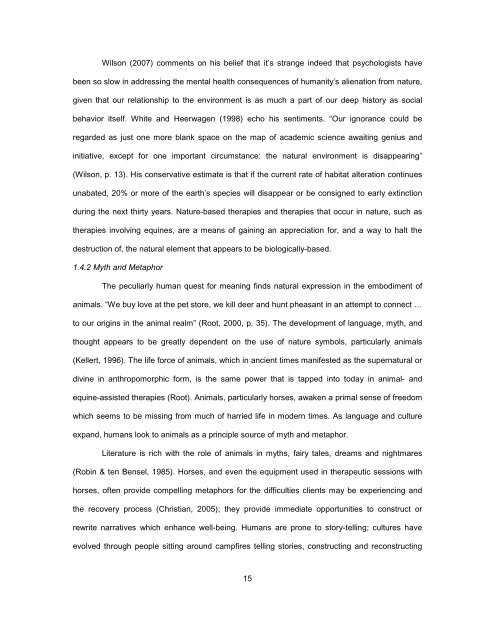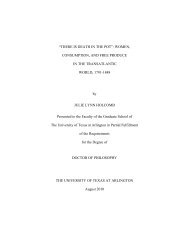A SYSTEMATIC REVIEW OF THE EFFECTS OF PSYCHOTHERAPY ...
A SYSTEMATIC REVIEW OF THE EFFECTS OF PSYCHOTHERAPY ...
A SYSTEMATIC REVIEW OF THE EFFECTS OF PSYCHOTHERAPY ...
You also want an ePaper? Increase the reach of your titles
YUMPU automatically turns print PDFs into web optimized ePapers that Google loves.
Wilson (2007) comments on his belief that it’s strange indeed that psychologists have<br />
been so slow in addressing the mental health consequences of humanity’s alienation from nature,<br />
given that our relationship to the environment is as much a part of our deep history as social<br />
behavior itself. White and Heerwagen (1998) echo his sentiments. “Our ignorance could be<br />
regarded as just one more blank space on the map of academic science awaiting genius and<br />
initiative, except for one important circumstance: the natural environment is disappearing”<br />
(Wilson, p. 13). His conservative estimate is that if the current rate of habitat alteration continues<br />
unabated, 20% or more of the earth’s species will disappear or be consigned to early extinction<br />
during the next thirty years. Nature-based therapies and therapies that occur in nature, such as<br />
therapies involving equines, are a means of gaining an appreciation for, and a way to halt the<br />
destruction of, the natural element that appears to be biologically-based.<br />
1.4.2 Myth and Metaphor<br />
The peculiarly human quest for meaning finds natural expression in the embodiment of<br />
animals. “We buy love at the pet store, we kill deer and hunt pheasant in an attempt to connect …<br />
to our origins in the animal realm” (Root, 2000, p. 35). The development of language, myth, and<br />
thought appears to be greatly dependent on the use of nature symbols, particularly animals<br />
(Kellert, 1996). The life force of animals, which in ancient times manifested as the supernatural or<br />
divine in anthropomorphic form, is the same power that is tapped into today in animal- and<br />
equine-assisted therapies (Root). Animals, particularly horses, awaken a primal sense of freedom<br />
which seems to be missing from much of harried life in modern times. As language and culture<br />
expand, humans look to animals as a principle source of myth and metaphor.<br />
Literature is rich with the role of animals in myths, fairy tales, dreams and nightmares<br />
(Robin & ten Bensel, 1985). Horses, and even the equipment used in therapeutic sessions with<br />
horses, often provide compelling metaphors for the difficulties clients may be experiencing and<br />
the recovery process (Christian, 2005); they provide immediate opportunities to construct or<br />
rewrite narratives which enhance well-being. Humans are prone to story-telling; cultures have<br />
evolved through people sitting around campfires telling stories, constructing and reconstructing<br />
15
















